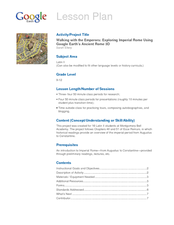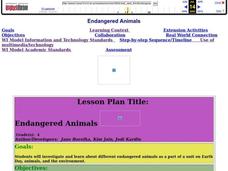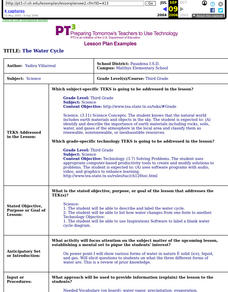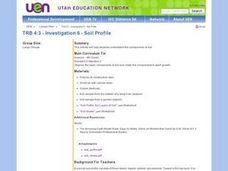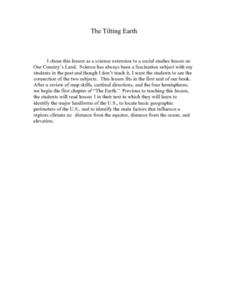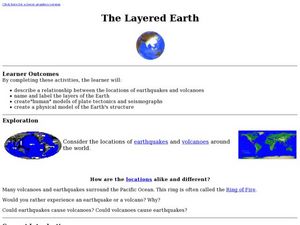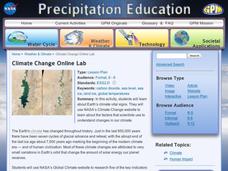Curated OER
Walking with the Emperors: Exploring Imperial Rome
Students travel Rome. In this geography skills instructional activity, students explore famous places in Rome with Google Earth tools. Students research the city of Rome and create touring videos that feature their findings.
Curated OER
Magnets
Students explore how the earth is a magnet and that magnets have two "poles". In this magnetic lesson students complete an activity by designing their own compass.
Curated OER
Endangered Animals
Fourth graders research different endangered animals in media center as part of unit on Earth Day, animals, and environment, create project based around multiple intelligence related to an endangered animal, and produce Powerpoint...
Curated OER
Kansas Ponds, Lakes & Reservoirs
Students compare the ponds, lakes, and reservoirs of Kansas. For this geography lesson, students use Google Earth to research the different ponds, lakes, and reservoirs in Kansas. Students will discover that many of the bodies of water...
Curated OER
Magnetic Fields and Bermuda Triangles
Young scholars map magnetic fields of a magnet using a compass and predict where fields cancel each other to create 'Bermuda Triangles'. In this magnetism lesson, students use a compass to map the magnetic field of a magnet. They explain...
Curated OER
The Water Cycle--Using Inspiration Software
Third graders describe and label the water cycle, and list how water changes from one form to another; students use Inspiration Software to label a blank water cycle diagram.
Curated OER
Graham Cracker Plate Tectonics
In this plate tectonics worksheet, students use Graham crackers, frosting, water and a paper plate to simulate tectonic processes such as convergent, divergent and transforming plate boundaries.
Curated OER
How Much is Dirt Worth?
Fourth graders graph the percentages of the materials that make up the Earth and complete computations based on their results. In this topsoil lesson, 4th graders diagram the different layers of Earth's composition.
Curated OER
Using Venn Diagrams to Compare Two Ecosystems
Students explore the distribution of two ecosystems on a global scale; and map the distribution of tropical and temperate rain forests throughout the world. They use a Venn Diagram to describe these ecosystems and the differences between...
Curated OER
Sizing Up the Supersize Croc
Young scholars examine and compare traits of humans and crocodiles. In this crocodile lesson students use a ratio to estimate the height of a person and compare that to a crocodile.
Curated OER
Thinking About Life in Geological Time Scales
High schoolers create a large (classroom-sized) timeline showing the history of life on Earth for the last 5 billion years. They are able to identify the events that are relevant to their taxonomic projects (the Origins and important...
Curated OER
Pollution is Not a Solution
Students explore the environment by completing science worksheets in class. In this water conservation lesson, students identify ways water is used in our society and how we abuse the privilege. Students discuss methods to reduce water...
Curated OER
Investigation 6 - Soil Profile
Fourth graders study the components of soil. They observe the basic components of soil and relate the components to plant growth. They record color, texture, and kinds of materials on their profile log (light color, denser, grittier -...
Curated OER
Earth Day Crossword
For this crossword puzzle worksheet, students read the 25 clues about Earth Day. Students then complete the crossword puzzle about Earth Day.
Curated OER
The Tilting Earth
Fourth graders use a styrofoam ball on a stick to represent earth and a light bulb in the center of the room to represent the sun. They walk around the light, holding their sticks at an angle to show the tilt of the earth's axis. They...
Curated OER
The Layered Earth
Students role play plate tectonics by creating a "plate statue" made up of students. For this earth science lesson, students describe how Earth's movement cause earthquakes and volcanoes. They draw and name the different layers of the...
Curated OER
Grouping and Changing Materials
Pupils feel and observe different types of materials. Using the internet, they sort objects based on the materials they are made from and justify their reasons for putting it in a certain category. They identify objects that could fit...
Curated OER
Building Materials
Fifth graders are presented with three rocks and a variety of tools and are asked to investigate the properties of the rocks to see which rock is best for building tables and benches for a museum picnic area.
DiscoverE
Core Sampling
Simulate soil sample assemblages. Individuals create soil layers in a cup. They then use straws to collect core samples from these layers. What information can they glean from the core samples, I wonder?
Starry Night Education
The Year and Seasons
Turn your classroom into a live demonstration of how the earth and sun interact to create the four seasons. Using a globe, a light source, and a series of constellation cards, super scientists discover how the motion of these...
Lake Afton Public Observatory
Shadows, Angles, and the Seasons
Shine some light on the topic of seasonal change with this collection of activities. Whether it's by measuring the change in the length of their shadows, or modeling the earth's orbit around the sun using a lamp and a globe, these simple...
Curated OER
Water in the Biosphere
Environmental explorers examine the campus and take note of living organisms. Introduce them to the biosphere and the questions of the day: How much water can be found in the biosphere? A slide show helps you along, and even contains a...
Laboratory for Atmospheric and Space Physics
Where Are We Going?
Come take a ride on the space bus! Scholars go on an imaginary trip to pick up their peers from the inner and outer planets while reinforcing math skills. First, learners round decimals to identify each planets' distance from Earth....
NASA
Climate Change Online Lab
What are the key indicators that show scientists that our planet is in the fastest warming trend ever? Learners go on a WebQuest to examine the evidence for themselves. Following several links to NASA sites, kids see how the global...


